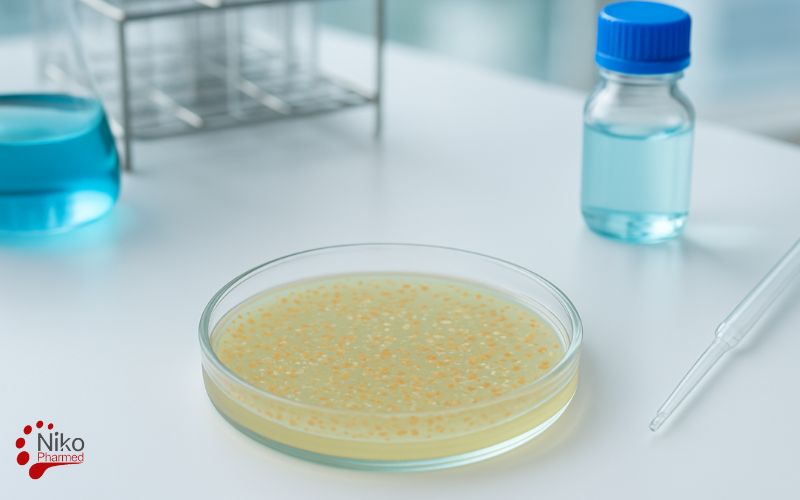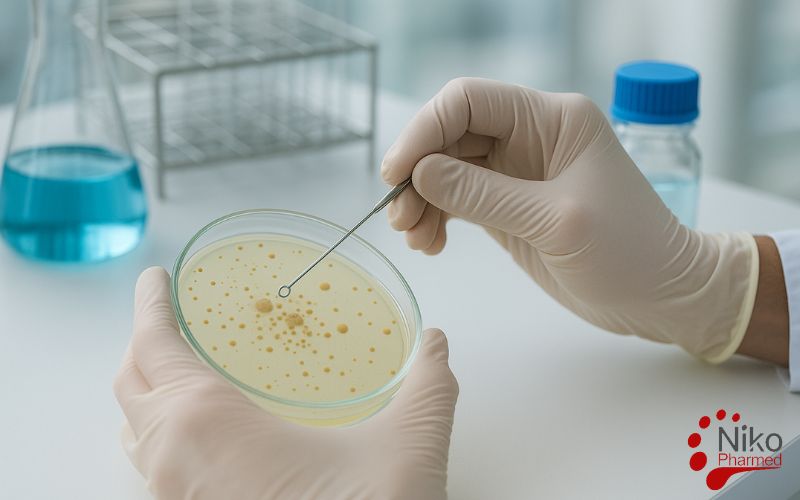What is Antimicrobial Effectiveness Testing?
Antimicrobial Effectiveness Testing (AET), as outlined in USP <51>, is a standardized procedure designed to evaluate the efficacy of antimicrobial preservatives in pharmaceutical, cosmetic, and personal care products. Antimicrobial effectiveness testing ensures that a product’s preservative system can effectively inhibit the growth of specified microorganisms that may be introduced during manufacturing or normal use. According to USP <51>, the test involves inoculating the product with a defined concentration of five challenge organisms—Staphylococcus aureus, Pseudomonas aeruginosa, Escherichia coli, Candida albicans, and Aspergillus brasiliensis—and monitoring microbial reduction over a 28-day period.
The product must demonstrate a specified log reduction in bacterial count within 14 days and no increase in fungal counts thereafter to be deemed compliant. Antimicrobial effectiveness testing is critical for ensuring the microbial stability and safety of multi-dose products throughout their intended shelf life.
Antimicrobial Effectiveness Testing Procedure
The purpose of this procedure is to ensure that the preservative system can effectively inhibit or kill specific microbial contaminants that may be inadvertently introduced during manufacturing, storage, or routine consumer use. The test is essential for validating product stability and safety throughout its intended shelf life, particularly for multi-dose preparations that are not terminally sterilized.
Procedure Overview
The test begins with the aseptic inoculation of the finished product—packaged in its final container configuration—with a high-level microbial challenge. The challenge consists of five standardized test microorganisms representing a range of microbial classes and resistance profiles:
- Staphylococcus aureus (ATCC 6538), a Gram-positive bacterium
- Pseudomonas aeruginosa (ATCC 9027), a Gram-negative bacterium
- Escherichia coli (ATCC 8739), a Gram-negative enteric bacterium
- Candida albicans (ATCC 10231), a yeast
- Aspergillus brasiliensis (ATCC 16404), a filamentous fungus
Each organism is prepared in logarithmic-phase cultures and introduced individually into aliquots of the test product at a concentration of 1.0 × 10⁵ to 1.0 × 10⁶ CFU/mL. The inoculated samples are then held under controlled environmental conditions, typically 20°C to 25°C, shielded from light unless otherwise specified.
Sampling and Evaluation
Quantitative microbial counts are performed at defined intervals: Day 0 (immediately after inoculation), Day 14, and Day 28. Microbial recovery is carried out using validated neutralization techniques or membrane filtration to inactivate the preservative without adversely affecting the viability of any surviving organisms. Enumeration is typically performed using plate count methods on appropriate selective or non-selective agar media, followed by incubation under conditions optimal for each microorganism. For active ingredient screening or comparison of formulations, our MIC/MBC testing and disk diffusion testing services provide quantitative and semi-quantitative measures of antimicrobial potency.
Acceptance Criteria
The test acceptance criteria are based on organism-specific log reductions and/or growth inhibition over time:
- For bacteria (S. aureus, P. aeruginosa, E. coli): A minimum of 3.0 log₁₀ reduction at 14 days, with no increase through 28 days.
- For fungi (C. albicans, A. brasiliensis): No increase in viable counts from the initial (Day 0) level at 14 and 28 days.
Failure to meet these criteria indicates inadequate preservative performance, necessitating reformulation or further evaluation.
Controls and Validation
Critical to the accuracy of AET is the use of robust controls. These include:
Neutralization Controls: To ensure complete inactivation of preservatives during microbial recovery.
Viability Controls: To confirm the integrity and recovery of challenge organisms in the absence of preservatives.
Growth Promotion Tests: To verify that the culture media support the growth of the test organisms.
Why Choose Nikopharmad for Your Antimicrobial Effectiveness Testing (AET) Needs?
ILAC Accreditation & ISO/IEC 17025 Certification
Nikopharmad Laboratory is fully accredited under the ILAC Mutual Recognition Arrangement and certified to ISO/IEC 17025 standards, ensuring that our Antimicrobial Effectiveness Testing (AET) services meet the highest international benchmarks for analytical accuracy, reproducibility, and technical competence.
Comprehensive Preservative Efficacy Testing Services
We offer a complete portfolio of validated Antimicrobial Effectiveness Testing services, performed in strict accordance with pharmacopeial standards such as USP <51>, EP 5.1.3, and JP guidelines. Our testing protocols are designed to assess the antimicrobial preservative effectiveness across a wide range of product types, including pharmaceuticals, cosmetics, and personal care formulations. In many cases, preservative efficacy studies are complemented by antibacterial testing of finished products to confirm overall microbial performance.
All tests are performed using the compendial challenge organisms: Staphylococcus aureus, Pseudomonas aeruginosa, Escherichia coli, Candida albicans, and Aspergillus brasiliensis. Each method is scientifically validated for accuracy, neutralization effectiveness, and microbial recovery to address product-specific formulation challenges and potential interferences.
Expert Scientific Staff & Advanced Laboratory Infrastructure
Nikopharmad’s AET services are led by a team of seasoned microbiologists, pharmaceutical scientists, and regulatory professionals with deep expertise in preservative efficacy, microbiological quality control, and method validation. Our laboratory features cutting-edge microbial testing infrastructure, including:
- Certified biosafety cabinets and validated cleanroom environments
- Media preparation systems and depyrogenation ovens
- Automated microbial enumeration and identification platforms
- Calibrated, controlled-temperature incubators in compliance with compendial guidelines
All tests are conducted under strict environmental control to ensure test reliability, precision, and compliance.
Accelerated Timelines with Validated Methodologies
We understand the critical nature of timely preservative validation in product development and regulatory timelines. Nikopharmad offers streamlined workflows and optimized protocols that significantly reduce turnaround time—without compromising data integrity or regulatory compliance. Our validated methods support efficient movement through formulation screening, stability testing, and commercial release phases.
Competitive & Transparent Pricing
Nikopharmad is committed to providing cost-effective and transparent pricing for all AET services. Our pricing model is designed to deliver exceptional value without sacrificing quality or compliance, making us an ideal partner for startups, CDMOs, and large-scale manufacturers alike. Volume-based discounts and project-specific packages are available to support both early-stage and commercial-scale programs.
Data Security & Intellectual Property Protection
Client confidentiality is integral to our operations. We enforce stringent data security protocols, secure digital recordkeeping systems, and binding non-disclosure agreements (NDAs) to safeguard all client data. Our audit-ready documentation ensures full traceability and aligns with FDA 21 CFR Part 11 and global data integrity standards.
Regulatory Compliance & Global Submission Support
All Nikopharmad AET reports are formatted to align with global regulatory requirements, including USP <51>, EP 5.1.3, JP, and ICH Q6A. Reports include comprehensive method validation summaries, traceable microbial strain data, inhibition/enhancement controls, and clear pass/fail outcomes based on pharmacopeial specifications. Whether for FDA, EMA, PMDA, NMPA, or other health authorities, our services support regulatory readiness and successful market access.
To request testing or a complimentary consultation contact Nikopharmad
Partner with Nikopharmad for Accurate, Compliant, and Cost-Effective AET
By selecting Nikopharmad for your Antimicrobial Effectiveness Testing needs, you gain a globally recognized laboratory partner with proven expertise, rapid turnaround, regulatory alignment—and highly competitive pricing. We deliver dependable, high-quality results that ensure your products meet global preservative efficacy standards and are ready for safe, compliant market distribution.
Conclusion
USP <51> Antimicrobial Effectiveness Testing is a fundamental component of product safety evaluation, regulatory compliance, and quality assurance. The procedure is highly structured and scientifically grounded, requiring strict adherence to aseptic technique, validated methodologies, and interpretive criteria. Successful completion of AET provides evidence that the preservative system is robust, necessary, and effective in maintaining microbial control over the product’s intended shelf life under foreseeable use conditions.


